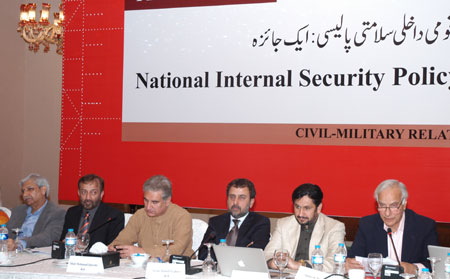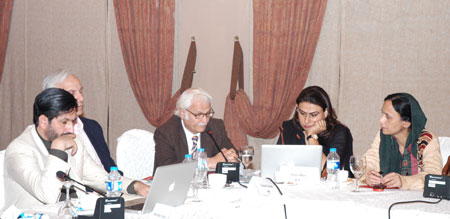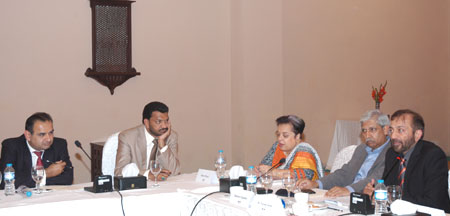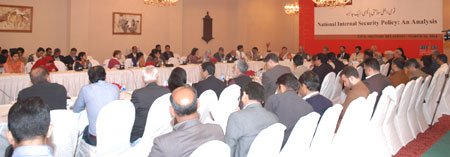|
|
| |
| EVENTS |
|
|
> Parliamentary Oversight Mechanism Required to Oversee Implementation of National Security Policy
|
|
|
| |
March 26; An appropriate Parliamentary oversight mechanism is required to oversee the implementation of the National Internal Security Policy, believed MPs and experts speaking at a Public Forum on National Internal Security Policy - An Analysis, organised by PILDAT. |
|
| |
With Mr. Shah Mahmood Qureshi, MNA, former Foreign Minister of Pakistan, in the chair, the Forum included Mr. Saleem Safi, Analyst, Sardar Awais Ahmad Leghari, MNA, (PML-N) and Chairperson National Assembly Standing Committee on Foreign Affairs, Ms. Shireen Mazari, MNA (PTI), Senator Farhatullah Babar (PPPP), Mr. Farooq Sattar, MNA, Parliamentary Leader of the MQM in the National Assembly, Mr. Tasneem Noorani, former Federal Secretary Interior, and Air Vice Marshall (Retd.) Shahzad Chaudhry, Defence Analyst, as Speakers.
|
|
| |
Mr. Saleem Safi said that the NISP offers a good first step and provides good coordination mechanism of LEAs. The NISP has expanded upon the parameters of dialogue by including civil society and imams of mosques, however political parties and MPs have not been consulted in preparing the NISP. Similarly Provincial Governments have also not been consulted. He said that after Government formation in June 2013, precious time has been wasted in preparing the NISP by the PML-N. He said that even though the Government claims that the security agencies are on board with the NISP, informed sources state that the Military and Intelligence Agencies have reservations on the NISP and claim that they have not been consulted. The policy requires coordinated efforts for implementation and presumes that the various actors will cooperate. He said that despite tall claims by the Government, the CCNS Secretariat has not been made functional so far. Even though the NISP uses talks with Taliban as an option,
the current framework of talks have been prepared outside the scope of NACTA. State institutions such as the Islamic Ideology Council have failed to provide the necessary counter-narrative because the leadership of it have been given as a political bribe and not based on merit. |
|
| |
Ms. Shireen Mazari, MNA, said that the NISP offers a good collation of data. Even though the Government had said that it will offer case studies of how other countries have tackled terrorism but these have not been provided in the policy. Qualification of who will head NACTA should have been provided in the policy. She also suggested that NACTA should have a technical board. She believed that while the NISP offers tactics, it provides no policy. She agreed with Mr. Safi that internal policy can not be seen in isolation. She added that Dis-engage, isolate and terminate are the 3 pronged strategy of the PTI in dealing with terrorism. Police needs to be depoliticised and de-weaponisation has to be undertaken in Karachi. |
|
| |
Sardar Awais Ahmad Leghari, MNA, said that an across-the-political spectrum consensus exists on stricter border management in Pakistan, as presented by the Standing Committee on Foreign Affairs. He noted that the NISP rightly mentions border control; and management as a critical area of internal security. Mr. Leghari highlighted the threat posed by sectarianism and said that Pakistan needs to put in place a clear-cut policy. |
|
| |
Presenting an analysis of the NISP, Mr. Tasneem Noorani said that the policy mentions dialogue as the most preferred though not the only option. How would the criminal justice system be strengthened has been left unsaid in the policy? While everything in the policy is dependent on NACTA, there seems to be no hurry to have a credible head for NACTA. He said that the policy has detail organogram of bodies to be setup but very guarded and caution on the tough issues. The only thing that stands out of policy is Dialogue as the main plank of the policy. |
|
| |
Air Vice Marshall (Retd.) Shahzad Chaudhry said that the NISP is a good beginning but Parliament needs to improve upon it. He said that while terrorism poses an existential threat to Pakistan, the role of State is in providing good governance and its policy formulation is indicative of protecting the people. Fighting terrorism is an art and a science while it is being dealt with as a philosophy. Intelligence collation is a problem in every country. |
|
| |
Senator Farhatullah Babar said that running with hares and hunting with hounds can not constitute as a policy of the State. Threat from non-State actors that are even protected by the State should have been discouraged in the policy. This major threat perception has not been dealt with in the NISP. He said that the split policy is not that of the political Governments but that which has been adopted by the State institutions overtime. He said that there exists a disconnect between the civil society, political society and the security apparatus. This disconnect should be acknowledged before it can be addressed. He said that the Interior Minister has been on record on the floor of the Senate that there exists a disconnect in the civil and the military but the policy created under his Ministry does not acknowledge it. He said that the policy appears to be a hastily-done document, at places copying sentences and phrases from various documents such as the US Patriot Act and the US National
Security Policy. He said that media is a powerful actor in developing the narrative, an aspect which has not been covered under the NISP. For Border management, while the policy mentions NACTA, Interior Ministry and SAFRON as the key institutions charged with this, the Foreign Office is conspicuous by its absence from the list. He said the most worrisome aspect in the NISP is the way the role of the ISI has been defined, as mentioned on page 76 of the NISP, which says that law enforcement constitutes one of the functions of the ISI. He questioned how law enforcement is a role of the ISI when the ISI's functions itself are not governed under a law. The role of the ISI is intelligence gathering only, he added. |
|
| |
Mr. Farooq Sattar, MNA, Parliamentary Leader of the MQM in the National Assembly, said that the country is in a race against time against those elements that wish to impose their version of religion on the majority of the population. He said that radicalisation of the State and Society of Pakistan is the biggest problem and the root cause of crises facing the country. However, he lamented, that there exists no uniformity of view on this root cause, which is essential for finding a unanimous solution. Without de-radicalising the State and Society, and without ownership of all segments, no policy will work in this respect. This lack of clarity has led to a scenario in which the world capitals are questioning whether Pakistan is a successful or a failed State. He said that the NISP should indeed be Pakistan's National Security Policy.
Opening the Forum, Ms. Aasiya Riaz, Joint Director PILDAT, said that Pakistan has unveiled its first ever National Internal Security Policy (NISP) after 67 years of its existence. The NISP was presented in the National Assembly on February 26, 2014 after the approval of Federal Cabinet. Being the first-ever policy of its kind in the country, the NISP is worth analysing at all relevant forums in the country. She said that PILDAT has organized the Forum for MPs and Political Parties so as to provide a critical analysis of the NISP for the benefit of Parliamentarians, who have to engage not just in policy analysis but find effective means to oversee the implementation of the policy both in the short and the long-term. She said that PILDAT believes that now that a policy is in place, the critical question is that of the need for a review and oversight mechanism in place for the policy. She raised questions such as what is the role of the CCNS in oversight of implementation of the NISP. Is the Government planning on presenting a periodic review of the implementation of the NISP and present it to the Parliament? She presented the example of the UK Government's annual report on Strategic Defence and Security Review in this regard. She also drew the attention of Parliamentarians to the question on the role of the Parliament in overseeing implementation of the NISP. Would a special body like that of the Parliamentary Committee on National Security be put in place to oversee the implementation? Again, drawing on the UK example, she shared that in the UK Parliament, for instance, when the first National Security Policy of the UK Government was launched in October 2010, a special Joint Committee of the UK Parliament on National Security Strategy was formed as a Committee of both Houses of the UK Parliament to consider the UK National Security Strategy. The Committee brings together 22 members of both the House of Commons and the House of Lords, including the chairs of the relevant Commons departmental select committees to consider the National Security Strategy.
A large number of Parliamentary representatives of leading political parties, academics, citizens groups and media representatives participated in the discussion at the Forum.
A Discussion Paper, titled the National Internal Security Policy - An Analysis, commissioned by PILDAT and authored by Mr. Saleem Safi, was also unveiled at the Forum. |
|
| |
|
|
| |

|
|
| |
|
|
| |

|
|
| |
|
|
| |

|
|
| |
|
|
| |

|
|
|
|
|
|
|
|
|